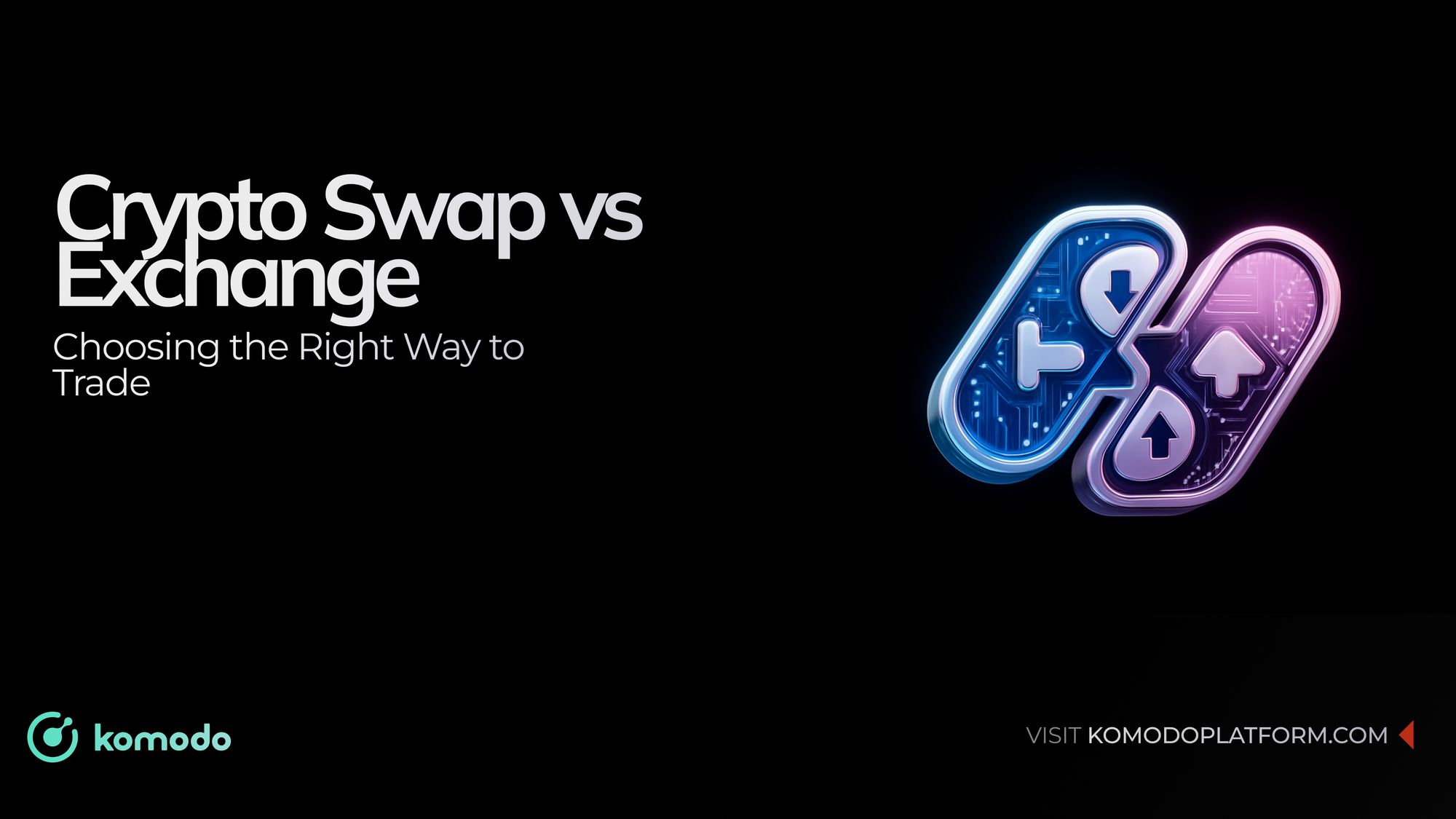As cryptocurrency gains popularity, the options for trading digital assets are expanding. Two of the most common methods are crypto swaps and crypto exchanges. While both enable cryptocurrency trading, understanding their differences is key to choosing the right approach for your goals.
In this article, we’ll dive into the crypto swap vs. exchange debate, exploring how each works and the unique advantages they offer in crypto trading.
What is a Crypto Swap?
A crypto swap is a decentralized method of trading cryptocurrencies directly—without relying on a centralized intermediary. These swaps are typically executed through decentralized exchanges (DEXs), where users retain full control over their assets throughout the transaction.
Rather than placing orders in an order book, swaps often occur through liquidity pools, enabling near-instant, peer-to-peer trades.
| Feature | Description |
|---|---|
| Decentralized | No central authority controls the process |
| Low Fees | Swapping cryptocurrencies often comes with lower fees compared to exchanges |
| Quick Transactions | Swaps happen instantly, especially on decentralized platforms |
| Privacy | Many crypto swaps do not require extensive KYC/AML (Know Your Customer/Anti-Money Laundering) processes |
So, swapping crypto is ideal for users seeking fast, low-cost, and private crypto transactions, especially when trading directly from their wallets.
What is a Crypto Exchange?
A crypto exchange, on the other hand, is a platform where users can buy, sell, or trade cryptocurrencies with other users or the exchange itself acting as an intermediary. Centralized exchanges (CEXs) as well as decentralized exchanges, allow for a wide range of trading options. Users deposit their cryptocurrencies into the exchange’s wallet and can then place buy or sell orders, with the exchange matching buyers and sellers.
| Feature | Description |
|---|---|
| Centralized or Decentralized | Centralized exchanges are run by companies, while decentralized exchanges allow for peer-to-peer trading |
| Variety of Coins | Exchanges often offer a broader range of cryptocurrencies for trading |
| Trading Pairs | Traders can buy or sell a variety of coin pairs based on market demand |
| Security Measures | Centralized exchanges typically have more robust security measures, but they require users to trust the platform with their funds |
The Difference Between Swap and Exchange in Crypto Trading
While both crypto swaps and exchanges enable users to trade cryptocurrencies, the difference between swap and exchange lies in how the transactions occur, the platforms used, and the fees associated.
| Criteria | Crypto Swap | Crypto Exchange |
|---|---|---|
| Trading Method | Directly exchange one cryptocurrency for another | Buy, sell, or trade with platforms |
| Centralization | Decentralized, peer-to-peer transactions | Can be centralized or decentralized |
| Security | More secure due to decentralization, no middleman | Crypto exchanges pool funds together presenting a more attractive target for hackers |
| Fees | Generally lower fees, no intermediaries | Higher fees, especially for large trades |
Crypto Trading Methods: Which is Better for You?
When deciding between swap vs exchange crypto, it’s important to consider factors such as the type of transaction, the cryptocurrencies you wish to trade, and the overall cost of the process.
Crypto Swap Advantages
Crypto swaps provide a more private and secure way to exchange assets, allowing users to maintain control without the need to share personal information or rely on intermediaries. This method also tends to be more cost-effective due to lower fees, making it ideal for users who value security and affordability.
- Anonymity - You maintain greater control over your assets without having to provide personal information.
- Security - Each user has their own key to access their funds and does not rely on an intermediary.
- Lower Fees - The lack of a middleman means lower transaction fees.
Crypto Exchange Advantages
Centralized crypto exchanges offer fast transaction speeds and high liquidity, making them well-suited for traders who need to execute large orders quickly. Their user-friendly platforms and extensive trading options also appeal to both beginners and experienced traders focused on efficiency.
- Speed - Trading done on a centralized database is much faster than crypto swaps.
- Liquidity - Crypto exchanges tend to have higher liquidity, which may be beneficial for large trades.
Which One Should You Choose?
Ultimately, your choice between a crypto swap vs exchange depends on your trading preferences, the types of cryptocurrencies you wish to trade, and your priorities regarding fees, security, and convenience.
- Crypto swaps are ideal for those looking for fast, low-fee transactions with increased privacy, especially for smaller trades, and those who want a wide selection of coins and additional features like staking or margin trading.
- Crypto exchanges are better suited for more complex trades, large transactions.
If you are looking for a simple, secure and low-cost method to trade your cryptocurrencies, crypto swaps are an excellent choice. However, for a more advanced trading experience, a crypto exchange may be the better option.
FAQs
Can I trade all cryptocurrencies using a swap?
Not all cryptocurrencies are available for swapping on every platform. Be sure to check the specific swap service or DEX for supported assets.
How do I choose between a decentralized and centralized exchange?
Choosing between a decentralized or centralized exchange depends on your priorities. Decentralized exchanges offer greater privacy, but centralized exchanges provide enhanced security and liquidity for larger trades.
Can I use both crypto swaps and exchanges?
Yes, you can use both methods depending on your trading needs. Many traders use crypto exchanges for larger trades and more complex features, while crypto swaps are ideal for quick, low-fee transactions with privacy.
